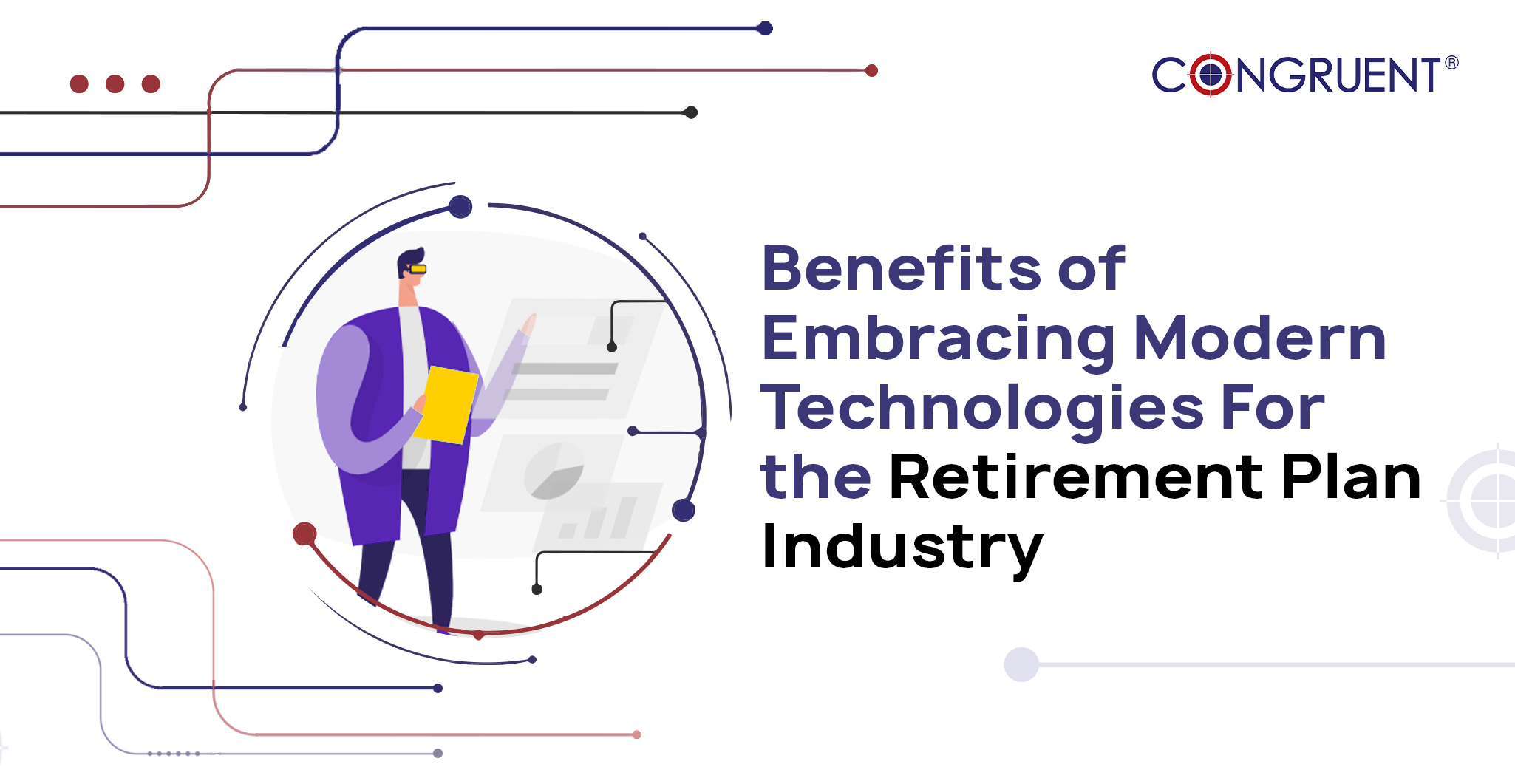
INTRODUCTION
As the retirement industry continues to evolve, there is a pressing need for modern technology advancements to streamline operations, enhance data security, enable intelligent processing, and deliver personalized solutions. Embracing modern technologies is crucial for staying competitive and meeting the evolving needs of retirees.
WITH POSSIBILITIES COME CHALLENGES
Data validation in the retirement industry faces several roadblocks due to the complexity and sensitivity of the data involved. Here are some common challenges:
- Cumulating multiple data sources – Combining and consolidating data from diverse sources into a unified dataset is a complex challenge with traditional systems in the retirement industry. This process entails gathering data from multiple systems, databases, or files and integrating them to create a comprehensive and cohesive view of the data.
- Inconsistency in record maintenance – Underwritersprocess hundreds of documents and emails manually. Maintaining consistency across different data sources and systems can be difficult, especially when integrating data from various sources or legacy systems. Inconsistent data formats, terminology, or coding can complicate data validation efforts.
- Unwarranted data lag – Vast amounts of unstructured data cause data lag, resulting in less reliability and outdated information. This can negatively impact decision-making, operational efficiency, and overall business performance.
- Difficulties in maintaining data quality – Manual errors harm data quality in the retirement industry. Mistakes in data entry, calculations or inconsistencies can compromise the accuracy and reliability of the data, leading to flawed analysis, reporting, and decision-making. Implementing stringent data validation processes and training is crucial to mitigate these errors.
- Protecting data – Protecting data in the retirement industry is vital to ensure the security and privacy of sensitive information. The widespread availability of data increases the risk of data breaches and unauthorized access. Given the sensitive nature of retirement-related information, such as personal and financial details, it becomes an attractive target for cybercriminals.
- Technology advancements – There is a need for technology advancements in the retirement industry to address gaps in information caused by non-communicative core systems. Traditional systems that lack integration and communication capabilities create silos of data, making it challenging to have a comprehensive view of retirement-related information.
SCOPE FOR OPPORTUNITIES
- Smart Mastering –
- Smart Mastering plays a crucial role in the retirement industry by maintaining a master record that serves as a single source of truth.
- It enables the harmonization and consolidation of data received from various sources, including financial institutions, insurance providers, and government entities.
- By establishing a central repository of accurate and up-to-date information, Smart Mastering ensures data consistency, improves data quality, and enables efficient data integration and analysis.
- This, in turn, enhances decision-making, regulatory compliance, customer service, and overall operational effectiveness in the retirement industry.
- Data cleansing and refurbishing –
- Data cleaning and refurbishing in the retirement industry is a crucial process that involves identifying and rectifying data errors, inconsistencies, and inaccuracies.
- It includes removing duplicate entries, standardizing data formats, correcting spelling and formatting errors, and validating data against predefined rules and criteria.
- The retirement industry can improve data quality, enhance data integrity, and ensure reliable and accurate information for decision-making, regulatory compliance, and customer service purposes by conducting data cleaning and refurbishing.
- This process is essential for maintaining the integrity and usability of data within the retirement industry.
- Modern digitizing practices –
- Integrating AI (Artificial Intelligence) in the retirement industry brings several benefits and advancements.
- AI-powered algorithms can analyze vast amounts of data, including financial records, market trends, and individual preferences, to provide personalized retirement planning recommendations.
- AI can assist in creating tailored investment portfolios, retirement income strategies, and risk management solutions based on an individual’s unique circumstances and goals.
- By harnessing the power of AI, retirement industry professionals can enhance their services, improve customer satisfaction, and ensure efficient risk management for a secure and prosperous retirement experience.
- Investing on data security –
- The retirement industry deals with highly sensitive personal and financial information of individuals, including retirement savings, investment details, and personal identification data.
- Robust data security measures, such as encryption, access controls, and secure data storage, are essential to protect this information from unauthorized access, data breaches, and identity theft.
- By investing in data security, organizations can demonstrate their commitment to safeguarding customer information, building trust, and maintaining a positive reputation in the industry.
- Intelligent data processing –
- Intelligent data processing in the retirement industry enables quick and accurate analysis of large volumes of retirement-related data, providing valuable insights and facilitating informed decision-making.
- By leveraging advanced technologies, intelligent data processing allows for the generation of personalized retirement solutions based on individual financial records, investment preferences, and risk profiles.
- Intelligent data processing techniques help identify and assess risks in retirement planning, such as market volatility and potential fraud, contributing to effective risk management and protection of retirement assets.
TO THE FUTURE
In conclusion, the retirement industry can benefit significantly from modern technology and advanced data processing techniques. Intelligent data processing enables efficient analysis, personalized solutions, risk assessment, and fraud detection. Additionally, investing in data security and adopting well-defined processes and control mechanisms can significantly impact the industry’s future by improving efficiency, compliance, customer experience, and scalability. By embracing these advancements, the retirement industry can better serve its clients, ensure data privacy and security, and confidently navigate the evolving landscape.
Experience a seamless data management journey with Congruent! Join us on this transformative path.
